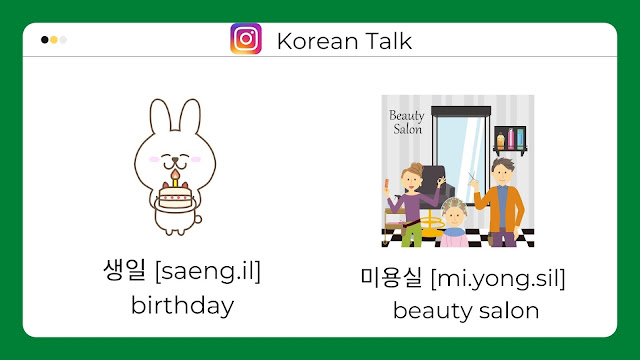I have been asked about “Korean pronunciation” questions by many learners on my IG for a long time.
The most common Korean pronunciation questions are as be blow:
1. Why ㄱ sometimes sounds like [ g ] instead of [ k ] ?
2. Why ㄷ sometimes sounds like [ d ] instead of [ t ] ?
3. Why ㄹ sometimes sounds like [ r ] instead of [ l ] ?
4. Why ㅅ sometimes sounds like [ t ] instead of [ s ] ?
5. Why ㅆ sometimes sounds like [ ss ] or [ t ] and also have [ ㄴ] sound?
Here, I am telling you the REASON why Korean pronunciation looks so hard as you thought before.
After you realize the reason, you will feel it’s not that difficult to learn Korean pronunciation anymore.
When you start learning Korean, you may see Korean words and letters written out in English letters.▼
It may help you with learning Korean pronunciation in the beginning.
Read more (click here) >> Learn Korean culture and language
Learn 100 Basic Korean words on Korean Talk YouTube video ▼
However, this is also the same reason makes you so confused about the pronunciation.
And it will take you longer time to learn proper pronunciation on your learning journey.
Why?
Because except 한글
(Hangeul) Korean original pronunciation.
There are 2 pronunciation systems for foreign
learners to use when they first time learning Korean.
One is Romanization, another one is IPA. ▼There are 2 pronunciation systems for foreign learners to use when they first time learning Korean.
Read more (click here) >> Get to know Korean more with different Korea Topic
This is one of the reason makes you so headache when you see same Korean character with different pronunciations.
In Romanization " ㄱ " pronounces as [ g ] sound, from IPA " ㄱ " pronounces as [ k ] sound.
For example
You may see someone types "가 " as [ ga ] and you may also see another person types "가" as [ ka ].
Don’t get into the panic when you meets the situation.
There is nothing wrong with both.
No matter is Romanization or IPA, both of the pronunciation systems are just helping sound for you to remember the Korean alphabet pronunciation when you first time learning Korean.
You can choose one of the pronunciation systems to help you remember the Korean pronunciation sound, but don’t rely on them (Romanization or IPA)!
Reason 2Korean characters change the sound depending on the location in the word.
1. When "ㄹ" is at the beginning of the syllable, it sounds like more closer to [ r ] sound.
Words of example
라면 [ra.men] instant noodles
미래 [mi.rae] future
요리 [yo.ri] cooking
파리 [pa.ri] fly
거리 [geo.ri] street
러시아 [reo.si.a] Russia
리듬 [ri.deum] rhythm
그럼 [geu.reom] then
바라다 [ba.ra.da] to wish
레스토랑 [re.seu.to.rang] restaurant
2. When "ㄹ" is at the end of the syllable, it sounds like more closer to [ ㅣ ]Words of example
별 [byeol] star
말 [mal] words
월 [wol] month
달 [dal] moon
달걀 [dal.gyal] egg
오늘 [o.neul] today
생일 [saeng.il] birthday
경찰 [gyeong.chal] police
정말 [jeong.mal] really
미용실 [mi.yong.sil] beauty salon
Reason 3
Romanization for Korean pronunciation doesn't mean it's same as English
pronunciation.
For example, the Korean "ㄸ" is romanized as [ tt ].
However, it is pronounced differently than what you would hear with [ tt ].
Learning the Korean alphabets 한글
(Hangeul) is the easiest and most accurate way of improving your Korean
pronunciation.
How to learn Korean pronunciation effectively?
As I mentioned from last article, the Korean alphabets, known as 한글 (Hangeul), is a writing and phonetic
system for the Korean language.
Once you learn the Korean alphabet pronunciation, it’ll be easy to pronounce
words.
And you’ll be able to
speak Korean with confidence when you master the Korean alphabets.
I have Korean alphabet pronunciation lesson on YouTube, this is how Korean
people learned pronunciation when we were kids. ▼
This lesson would be helpful for you to learn Korean pronunciation just like a
local.
Try if you know correct "ㄹ" sound.
1. 질투해?
2. 따라 하지 마.
3. 그럼.
4. 오늘 파티다!
5. 결심했어요?
Answers
5. 결심했어요?
[gyeol.sim.hae.sseo.yo]
Have you made up your mind?
4. 오늘 파티다!
[o.neul pa.ti.da]
Today is party day!
3. 그럼.
[geu.reom]
Of course.
2. 따라 하지 마.
[tta.ra ha.ji ma]
Don't follow me.
1. 질투해?
[jil.tu.hae]
Are you jealous?
Most Popular Articles
 |
| OED Korean words |
 |
| How to pronounce ㅆ? |







